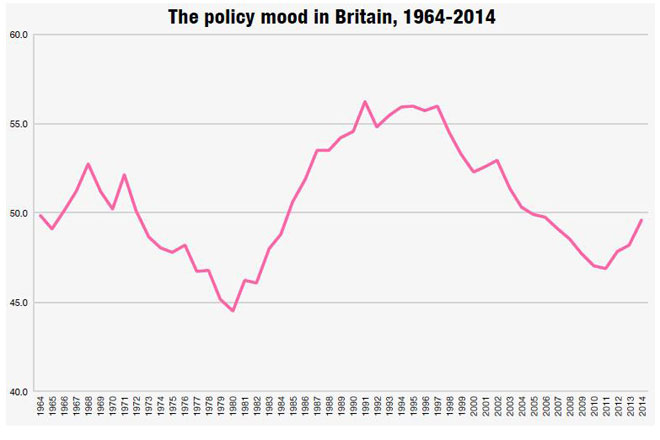
The report is published by NatCen and the University
New analysis of British Social Attitudes reveals Britain’s “political centre” has shifted left since 2010
The British public have become more left-wing since 2010, a new report published by NatCen Social Research and the University of Essex shows today. Using all the available survey data, including the latest findings from NatCen’s British Social Attitudes that will be published later this month, the analysis by Dr John Bartle tracks the British public’s average position on a left-right scale.
It shows that the “political centre” has oscillated left and right over the past 50 years but has shifted to the left since 2010. Driven by the public’s response to austerity, reductions in income tax and rising inequality, by 2014 the average position was back to where it had been in 2006, the year after Labour won its third election victory in a row.
Implications for the election
Despite this shift in the public mood, Labour – the major party of the left – has struggled to attract support. This indicates that Labour’s problems may be the result of its reputation for economic competence and leadership and the Conservative Party’s ability to portray itself as moderate. The shift to the left could also help explain the rise of the Greens and SNP in Scotland.
The analysis also suggests that the Conservatives must be careful not to allow their opponents to characterise them as hostile to key public services.

Policy mood swing in Britain 1964-2014
The grass is always greener
The political centre invariably moves against the government of the day. Beginning in 1964, the average left-right position generally tracked rightwards until 1980, the year after Margaret Thatcher came to power. The public then gradually moved left-during the 1980s and remained there for the duration of the Major premiership. The mood shifted rightwards from 1997 under New Labour and then left under the Coalition. Consequently, governing parties that achieve their party’s preferred policies cut the electoral ground from beneath their own feet: a Conservative government that reduces spending and taxes reduces concerns about waste and regulation, while a Labour government that increases resources to the NHS and education reduces concerns about public services.
Dr John Bartle explains: “The general leftward shift that has taken place since the last General Election suggests that arguments about the need to shrink the state, reduce waste and cut income taxes will have less traction than in 2010.”
ENDS
For further details contact: Leigh Marshall leigh.marshall@natcen.ac.uk 0207 549 8506 or to arrange to speak with Dr John Bartle contact Vicky Passingham or email: comms@essex.ac.uk 01206 87 2400.
Notes to editors:
The policy mood: The “policy mood” is a score created by collating responses to hundreds of different survey questions that have been asked in at least two different years over the last 50 years. A score of 50 means that the nation is dead centre in its political attitudes; higher scores mean that Britain is to the left of the political centre; and lower scores mean that it is to the right. The trend over time is obtained by looking at the change in ratio of left:right scores over time.
NatCen Social Research is an independent, not for profit organisation. We believe that social research has the power to make life better. By really understanding the complexity of people’s lives and what they think about the issues that affect them, we give the public a powerful and influential role in shaping decisions and services that can make a difference to everyone.
Ranked in the top two per cent of world universities, and currently celebrating its 50th anniversary, the University of Essex has established a global reputation. Its pioneering research helps to inform policy and change lives. Placed in the top 20 UK universities for research quality, and consistently top for politics, it is an international community for original thinkers. In 2013 the University was awarded the only Regius Professorship for political science by HM The Queen. Essex students ranked the University sixth in the UK for satisfaction with their courses in the 2014 National Student Survey.